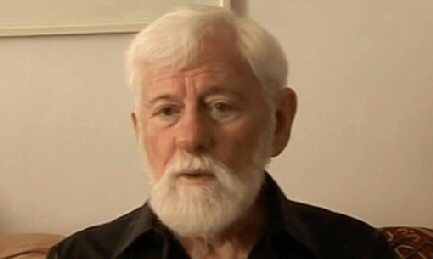 This Is Not A
BLOG!
This Is Not A
BLOG!
Date: 20/08/18
A Voice For Peace And Justice

Uri Avneri (né Helmut Ostermann)
Author, politician, peace campaigner
b. 10 September 1923, d. 20 August 2018
In his long life, Uri Avneri had many (and sometimes conflicting) rôles. An immigrant to Mandate Palestine from the early stages of Nazi Germany, he became a member of the Irgun terrorist group, but left after four years in disagreement with its tactics. This didn't stop him from writing for extremist Zionist periodicals, nor from fighting in the war which established the State of Israel.
Subsequently, he and the magazine he edited - HaOlam HaZeh - became a constant thorn in the side of corrupt politicians and officials. He himself became an elected politician, serving a total of twelve years in the Knesset.
His greatest contribution, however, was his determination to try to create a meaningful peace in Palestine. This led him to cross the front line during the siege of Beirut in 1982 to meet PLO chief Yassir Arafat (considered by Israelis to be their state's mortal enemy), and when interviewed about the Israel-enabled massacres of refugees at Sabra and Shatila a few weeks later, said (in response to a question as to how the survivors of the Sho'ah could look on and condone such an atrocity):
"It would be nice to believe that people who have undergone suffering have been purified by suffering. But it's the opposite, it makes them worse. It corrupts."
His conviction that peace could only come to Palestine through mutual justice and reconciliation led to his forming the Gush Shalom movement in 1993, an organisation which he subsequenly led with distinction for many years.
None of this, of course, endeared him to the promoters of the increasingly extreme forms of Zionism - allied to religious fundamentalism - which has dominated Israeli society and politics for the last few decades; he was stabbed several times in an attack in 1975, and was disowned by his own mother for talking to Arafat.
It is, however, in his writings in his later years that I came to know and appreciate Uri Avneri. His frequent essays for Counterpunch from the early days of its online incarnation - pieces which he continued to produce until mere days before his death - were written with a forensic acuity and an invigorating style, allied to his perspective of having fought to establish the very state whose pretensions and delusions he found increasingly distasteful. His excoriations of Zionist demigods such as Moshe Dayan and Golda Meir (the former a serial incompetent, the latter an implacable shrew) and his utter contempt for the corrupt, arrogant, hypocritical chancer Netanyahu, are masterpieces of skewering. At their feet - and those of many another - he laid the blame for the turning of the ideals for which he had fought into the mean-spirited, rabbi-ridden avowed ethnocracy which we see today.
Even in his latter days, he wasn't right about everything (he still believed in the possibility of the so-called 'two-state solution', for example). But he was right about the one key thing: that only a just and equitable solution to the issue of Palestine would ever bring a lasting peace and protect not only the Palestinians but his own people.
Uri Avneri was largely without honour in his own country. But, just maybe, when his people have awakened from their delirium of racial supremacy and self-mythologising, he will be viewed as a sort of prophet of what could be in the lands between the Mediterranean and the Jordan.

 This Is Not A
BLOG!
This Is Not A
BLOG!
